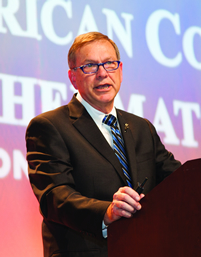
An innovation to education has the potential to change the world of health care by reaching far beyond the classroom, according to Daphne Koller, PhD, featured speaker at Saturday’s Opening Lecture and Awards session.
“We need to take a step forward in how we educate people,” Dr. Koller said.
The pedagogical advance is known as massive open online courses (MOOC), and Dr. Koller is president and co-founder of Coursera, an education platform that partners with top universities and organizations worldwide to offer online courses online that are open to anyone. Coursera has approximately 16 million students from around the world, roughly 1,500 courses, and nearly 140 education partners.
Sub-Saharan Africa, with about a quarter of the world’s disease burden and a shortage of medical workers, is a place where MOOCs can improve medical care, Dr. Koller said.
With traditional education, “It’s going to be decades before the pipeline is sufficiently large, if that ever happens,” she said. But the opportunity for educating health workers in that part of the world increases substantially through MOOC.
About a third of Coursera’s students are between the ages of 18 and 24. The largest age bracket is between the ages of 25 and 34, a group that is largely trying to take a step up and improve their careers, Dr. Koller said.
She shared an example from the School of Nursing at Johns Hopkins University, where Coursera offered a course on safety in health care to minimize mistakes that harmed patients. As it turned out, she said, about half the participants were victims of such accidents. The interaction between the victims and the providers enriched the class, she said.
Dr. Koller said that professors also learn from teaching online, applying lessons they learned from teaching online classes to their lecture halls on campus.
“I think there is a lot of potential for improving learning outcomes for students on campus,” she said.
ACR President E. William St.Clair, MD, opened the session with traditional presidential address, focusing on how ACR helps its members adapt to a modern health care system driven in large part by payment reform and performance-driven metrics.
“What has happened in the world of rheumatology over the last 30 years to shift the conversation from curing disease and alleviating suffering to EHRs, capitation, and payer reimbursement?” asked Dr. St.Clair, Chief of the Division of Rheumatology and Immunology at the Duke University School of Medicine.
Dr. St.Clair noted that the ACR launched a new website improve communications with domestic and international members and provide a platform for the ACR’s Learning Management System. He also discussed the ACR’s strong presence in Washington, D.C., and in state legislatures.
A main focus on the federal level, he said, is the Medicare Access and CHIP Reauthorization Act (MACRA), which replaced the Sustainable Growth Rate Formula. MACRA combined several quality reporting programs into a single program called the Merit-Based Incentive Program (MIPS).
Dr. St.Clair also said that rheumatologists should be developing alternative payment models that include compensation for activities, such as responding to a patient’s phone call or e-mail, that can help avoid an expensive service, such as a trip to the emergency room.
“Regardless of the alternative payment model, rheumatologists will be held accountable for the value of our services,” Dr. St.Clair said. “We should not wait until our hospital accounting systems catch up with the shift to value-based care and start now to measure performance.”
The ACR has developed and launched the RISE registry, which links EHRs with a central data repository and enables rheumatologists to monitor and analyze the care of their patients.
RISE is a Qualified Clinical Data Registry (QCDR), and MACRA allows group practices to report via QCDRs starting in 2016. The law also encourages eligible professionals to use these registries for MIPS reporting.
